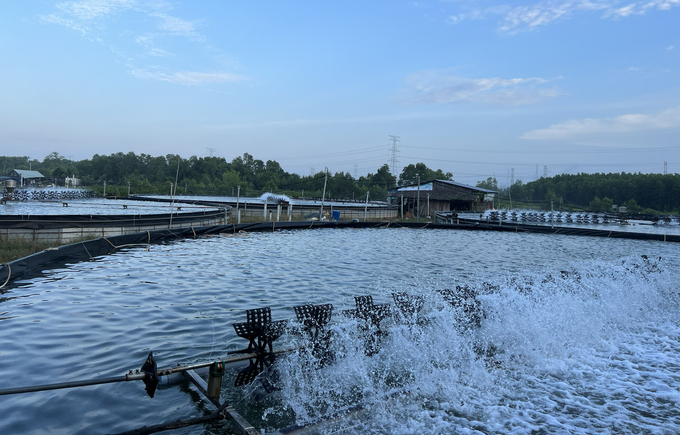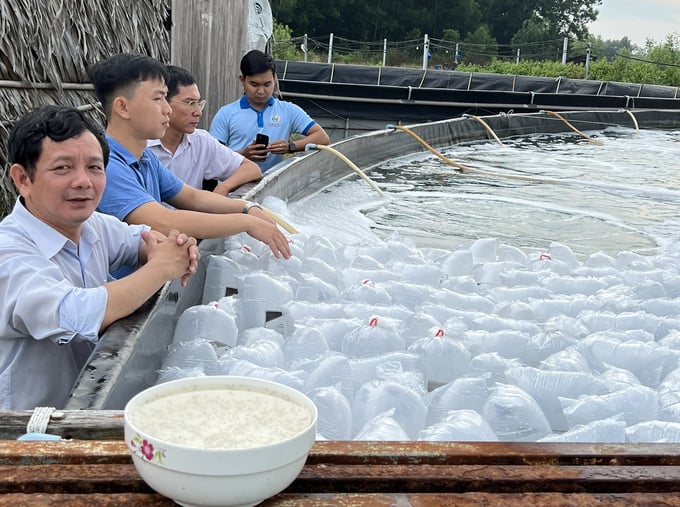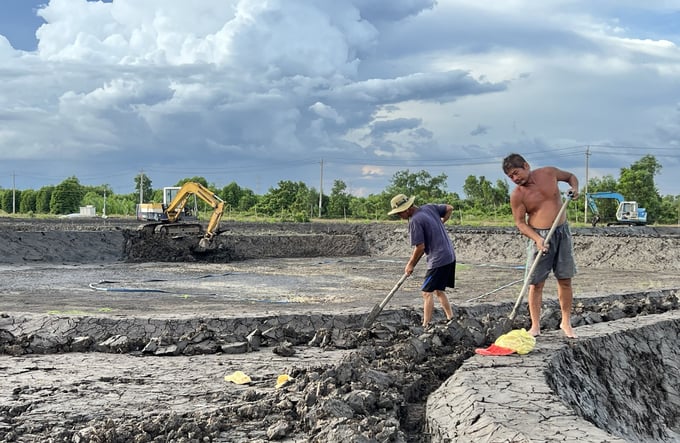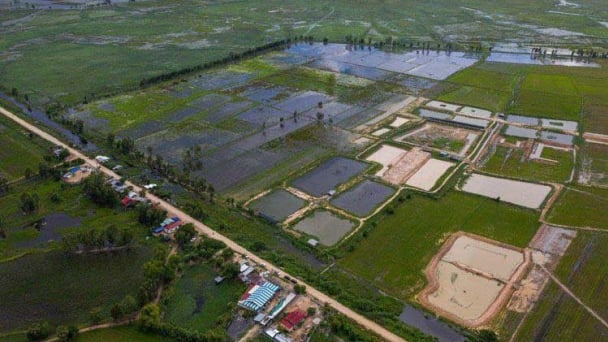May 17, 2025 | 12:12 GMT +7
May 17, 2025 | 12:12 GMT +7
Hotline: 0913.378.918
May 17, 2025 | 12:12 GMT +7
Hotline: 0913.378.918
According to the Dong Nai Fisheries Department, environmental conditions and water quality in Nhon Trach District are suitable for shrimp farming.
However, as the local farmers still practise traditional methods, the productivity is not high and there are many risks of shrimp diseases due to the polluted water.

High-tech shrimp production area of Thanh Cong cooperative. Photo: Tran Trung.
By 2016, a number of households began to get united together to gradually form groups or cooperatives to develop high-tech shrimp farming models. The results have been beyond expectations when the yield is much higher than the adaptation of the traditional farming method.
When the raw material area has been expanded sufficiently, seafood enterprises have also actively cooperated with farmers to build a sustainable link chain. The most prominent local cooperatives is the Thanh Cong Agricultural and Fishery Service Cooperative, whose director is Nguyen Huy Binh.
According to Binh, the establishment of the cooperative originated from the difficulties farmers face in aquaculture in general and shrimp farming in particular, such as low productivity, lack of capital and raw materials, polluted farming environment, potential diseases and difficulties in consumption, among others.
“They require shrimp farmers to cooperate to gather resources in finance, land, human, farming techniques, access to advances and input materials, feed, seedlings, as well as open up trade promotion activities for shrimp production and farming. That was how the Thanh Cong Agricultural and Fishery Service Cooperative was born,” he said.

Cooperative members learn to apply high technology in shrimp farming. Photo: MS.
The cooperative now has 9 members, with a total charter capital of VND15 billion and farming on a total area of 18 hectares. Thanks to scientific and methodical production, the cooperative can easily sign contracts with businesses and build linkages with local farmers. They have received support from a large local seafood enterprise to implement the Elanco Demo Farm model, a sustainable shrimp farming process that is biologically, microbiologically and nutritionally safe.
Particularly, the model focuses on the biosafety process to increase the success rate and is combined with products disinfecting farms and equipment as well as cleaning the supply water.
The most outstanding feature of Elanco Demo Farm is the application of modern technology 4.0 into the management and monitoring of shrimp ponds, which enables the farmers to make more accurate assessments, perform more methodical management and come up with more appropriate decisions.
“In the Elanco Demo Farm model, the results are achieved after 97 days of farming (for 4 ponds, each of which covers an area of 800sq.m) with a total output of 16,700 kg. Each kilo, including 35-37 shrimps, costs a monthly price of VND170,000 (in March 2021), FCR 1.34, bringing a profit of VND1 billion,” Binh noted.
Binh added that shrimp prices have been stable since the beginning of the year, earning a higher profit than last year. Harvesting initial success, the cooperative is continuing to expand its pond area in Vung Gam Hamlet, Phuoc An Commune.
However, the biggest concern of shrimp cooperatives and farmers today is the high investment cost in high-tech shrimp farming, so he hopes the local authorities will soon have a plan to support shrimp farmers with preferential capital.

The delegation of Dong Nai Agricultural Service Center visit and survey the high-tech shrimp farming model at Thanh Cong Cooperative. Photo: Tran Trung.
Chairman of Phuoc An Commune Farmers' Association, Pham Thanh Tuan, said that the total area of brackish water aquaculture in the commune is about 1.1 thousand hectares.
As the director of the cooperative, Binh has run the cooperative effectively. He has annually made development plans and provided appropriate solutions in production development, which therefore has improved members’ lives.
Currently, Thanh Cong Agriculture and Fisheries Service Cooperative is one of the few cooperatives in Nhon Trach District that could earn a high profit of billions of dong a year from a clean shrimp farming model.

The cooperative is about to expand 13 hectares of hi-tech shrimp ponds. Photo: MS.
The success rate of super-intensive shrimp farming applying high technology in Phuoc An in particular and Nhon Trach District in general is high. The farming area under this model has therefore increased rapidly, opening up many potentials for the seafood industry.
However, this model requires shrimp farmers to have high technological skills, regularly and continuously update scientific and technical progress to ensure success in production.
“High-tech agricultural production method is one of the focuses of the locality, in which, high-tech shrimp farming is encouraged by functional sectors. To support farmers to apply high technology in intensive shrimp farming, the authority of Nhon Trach District has a plan to invest in infrastructure such as roads, electricity lines, irrigation systems for aquaculture areas; establish shrimp cooperative groups and develop VietGAP shrimp farming areas. The locality has been concerned with attracting businesses to invest in sustainable aquaculture projects in the area,” said Pham Thanh Tuan, Chairman of Phuoc An Commune Farmers' Association.
Translated by Phuong Ha
/2025/05/16/3800-0-nongnghiep-143756.jpg)
(VAN) Suntory PepsiCo Vietnam coordinated with the Ministry of Education and Training to implement an education program on water conservation, reaching nearly 1 million primary school students nationwide.

(VAN) Vietnam’s TH Group officially put its high-tech fresh milk processing plant into operation in the Russian Federation, marking a historic moment as the first TH true MILK cartons were produced in Russia.

(VAN) Use of high-quality broodstock and biotechnology is regarded as the most effective approach to ensuring sustainable and economically viable shrimp aquaculture ahead of climate change and the emergence of increasingly intricate disease patterns.

(VAN) Carbon farming is a form of agricultural practices that helps absorb more greenhouse gases than it emits, through smart management of soil, crops, and livestock.

(VAN) This is a key content of the Memorandum of Understanding recently signed between the Vietnam Fisheries Society and Kunihiro Inc of Japan.

(VAN) To achieve the goal, local authorities and businesses in Kon Tum province have fully prepared the necessary conditions for the new Ngoc Linh ginseng planting season.

(VAN) Jiangsu province is gearing up to host training programs in Phnom Penh, the capital of Cambodia, this year to establish the Fish and Rice Corridor.